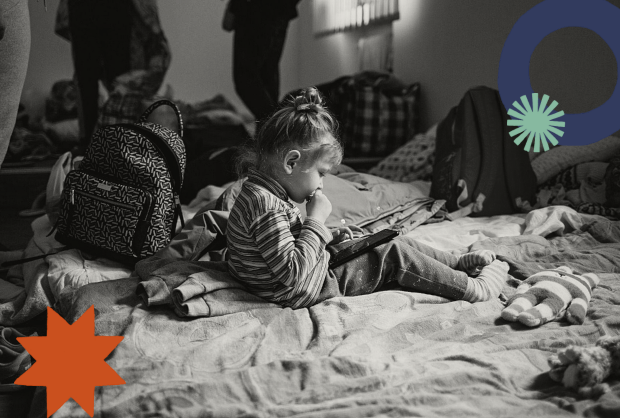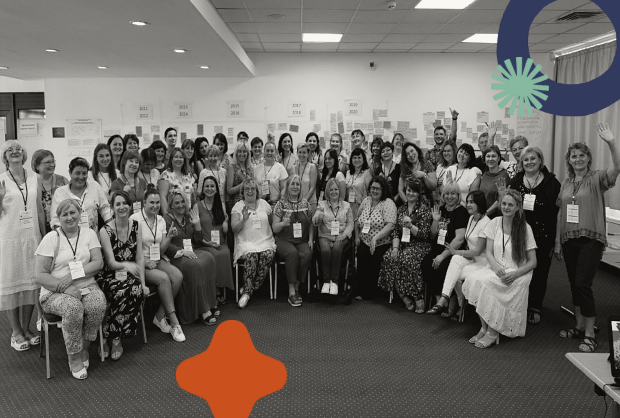The many internally displaced women in Ukraine can become important leaders in the rebuilding of the country, they believe.
By Mathilde Nordenlund
The bombs are still falling on Ukrainian cities, military areas and energy facilities.
In Danish news broadcasts and magazines, most stories right now are about the fighting in Bakhmut, in the eastern part of the country, and whether it will be Russia or Ukraine that launches a major offensive during the Spring.
But for Lyubov Maksymovychone of the leading figures in the Ukrainian women’s movement, and leader of the organization Women’s Perspectives, the focus has also begun to shift to how Ukraine will be rebuilt.
“We have no idea when the war will end, but we have to already look at how we can rebuild and develop the country, while the war is continuing,” she says.
Seven shelters and emergency support
During the first year of the war, Lyubov Maksymovych focused most of her attention to helping those who have fled Ukraine or are internally displaced.
Already on the second day of the war, she and her colleagues set up the first shelter for women and children fleeing from Eastern Ukraine to the Lviv area, in the western part of the country.
Mattresses, blankets, women and children filled the rooms of an office building in Lviv. More shelters were soon opened, and by the Autumn 2022 the NGO had already housed around 600 internally displaced people.

The organization, which before the war worked to promote women’s rights and human rights in Ukraine at a legislative and political level, has also become a humanitarian organization after the outbreak of the war, as Lyubov Maksymovych expresses it.
“It has been a very unusual situation. We have never run midway houses or shelters before. We used to work with prevention and political issues. But from one moment to the next, we started working with humanitarian support because it was necessary, and now we have seven shelters,” she says.
Lyubov Maksymovych
Lyubov Maksymovych heads the organisation Women’s Perspectives and is described by many as one of the leaders of the women’s movement in Ukraine.
She is also:
- Certified trainer in gender equality of the Ministry of Education
- Consultant of the National Democratic Institute
- National expert on issues of gender equality and program inclusions “Women in local bodies self-government” USAID
Over the past months, however, the focus has begun to shift, both for the organization and for the women, Lyubov Maksymovych meets at the shelters.
Need to “do something”
While many women and children to begin with often lived in the shelters for just a few days before moving on, many have now lived there more permanently for months.
“Last year, all the women we spoke to were obviously traumatized, and they did not talk about creating a future. Most of them told us, that they were waiting to go home. They thought that soon the war would end and then they would go home. But now the situation has changed, and most women can see that they can’t just wait, ”says Lyubov Maksymovych .
In the first year, the organization has, among other things, offered psychosocial support to the many women and children who have fled from the most war-torn areas to the western part of the country.
It is Lyubov Maksymovych’s experience that many of the women have gotten better, and that a form of everyday life during the war is beginning to emerge.
“Many of the women are starting to say now that they need to ‘do something’. They ask what they can do, how they can find a job. And many of them are aware that they need to get some new qualifications if they are to succeed.”
Local educational cooperation
According to Lyubov Maksymovych, a large part of the women used to work in the large factories that dominated the eastern part of Ukraine that are now destroyed by the war. Therefore, it is not straightforward for them to go out and find a job in the western part of the country.
“The problem is that companies lack labour, and there is high unemployment among the internally displaced, but they do not have the right qualifications. So we organize training and upskilling with a combination of theory online and practical training. We have started in textiles and IT, and we will soon be able to do it in other areas as well,” she says.
After the outbreak of the war, Women’s Perspectives began to work much more closely with other women’s rights organizations and partners.
In ten of the country’s regions, they have together investigated the needs of the many internally displaced women – both for humanitarian and social economic support.

In collaboration with local companies and city councils, they have arranged upskilling courses that should make it easier for them to find work. At the same time, they work together to develop the regions of Western Ukraine, even though the war is still ongoing.
Among other things, they focus on developing the construction industry, the textile industry and agriculture – production that used to be mainly concentrated further east. In the future, they also want to focus on tourism and IT companies, says Lyubov Maksymovych .
Strength and vision to lead the reconstruction
“Helping internally displaced people and developing our region go hand in hand. It’s funny, as soon as someone asks about the internally displaced, I start talking about our strategy for economic development in my region, but it’s connected because we have to support them to not only be victims, but to get a job and get a part of their life back,” says Lyubov Maksymovych.
For Lyubov Maksymovych, it is not just about helping the women and her region, but an important way to ensure a successful rebuilding of the country – and that women also play a role in it.
In her opinion, there is only one future scenario: that Ukraine wins the war. When she talks about the future, her starting point is Ukraine’s victory, it’s just a matter of when it will come.
“The other day, for example, I spoke to a woman who said she is still waiting. She is waiting to be able to travel back to her home in Eastern Ukraine. Then I asked her what she wanted to do when she got back,” tells Lyubov Maksymovych.
“It’s hard to know what they can do, but if they learn something new here or maybe start a small business, they will have more knowledge and more opportunities to support themselves, also when they go back.”
Lyubov Maksymovych hopes that experiencing becoming self-sufficient can help give the women a vision of how life can be when they return and everything is bombed and they have to start over.
WOMEN’S PERSPECTIVES AND KVINFO
Since January 2022, KVINFO has collaborated with the organization Women’s Perspectives to strengthen gender equality in Ukraine as a project under the Ministry of Foreign Affairs’ Neighborhood Programme.
The project’s aim is to strengthen women’s participation in politics, leadership and social and economic society.
Women’s Perspectives is a non-governmental organization that works for upholding women’s rights and supporting equal rights and possibilities of women and men in all areas of life.
Their activities aim at implementing gender politics in Ukraine, combating domestic violence and violence against women, increasing the competitiveness of women in the labour market and promoting women’s participation in decision-making processes in Ukraine.
With this collaboration, KVINFO and Women’s Perspectives try to challenge limiting gender norms and stereotypes, spread knowledge of economic equality through campaigns and knowledge production, and work to support people exposed to gender-based violence.
The project began before the war between Russia and Ukraine began, but has become even more relevant since.
Under the Neighbourhood Programme, , KVINFO also works together with the organisations Insight in Ukraine and in Georgia with Union Sapari, Women’s Information Center and Women’s Fund Georgia. LGBT+ Denmark is also a partner with KVINFO in this programme, working with Insight.
“It helps if she and the others travel back with more knowledge, with new skills, with an idea of what they can give back to their area. They will be more empowered, have more enthusiasm and motivation, and they will be able to take on the role of leaders in the work that lies ahead. In the new companies that need to be rebuilt,” she says and continues:
“Those who still live in Eastern Ukraine are still in the middle of the trauma, of course. Who will help give them strength and opportunities when the war is eventually over? In my eyes, the women who go home from here can bring new skills and strength to the development of Ukraine.”
“We have so many female leaders”
It is not difficult to find disheartening stories from the war in Ukraine in Danish and International media.
But even though Lyubov Maksymovych emphasizes that the war is terrible in many ways, she also allows herself to be overwhelmed by the unity and hope that the work during the war has also brought.
“The war has given us an opportunity to work much more together. Women, men, NGO’s, state – we work much closer together on common solutions than we have done before. We really feel that we have a strong democracy, and we appreciate it more. We believe in it,” she says.
At the same time, she finds that many stereotypical ideas about men’s and women’s roles have been broken down.
“I have worked with human rights and women’s rights for more than twenty years, but what has really surprised me in the last year is that we have so many female leaders. We have many women who want to lead companies, who want to be decision makers. They are coming forward now because everyone needs to do something.”
Political diversity essential in reconstruction
According to Lyubov Maksymovych, there is a perception now, during the war, that there are no problems with inequality between men and women. Everyone participates, both financially and in the discussions about the future.
The time after the war, and whether it will last, worries her though.
“We can so easily go back to how it was before. We must avoid that. When, at some point after the war, we end up with a lot of funds to be distributed for reconstruction, it is incredibly important that demands are made that equality is taken into account in how they are used,” says Lyubov Maksymovych.
She points out that one could create equality indicators, so that it becomes a requirement to examine what the advantages and disadvantages of certain buildings and projects are for the different sexes, and that the money is used so that it promotes equality.
“So far it’s just a dream, but we will work for it. For the same reason, we have also resumed our work on political representation, even though the war is still going on. We have just started the training of female political representatives, with support from KVINFO, so that we ensure that women and other minorities are also represented in all the important decisions that must be taken when the country is rebuilt,” she says.
“Then the rebuilding might actually be an opportunity to ensure more equality in the long run.”


